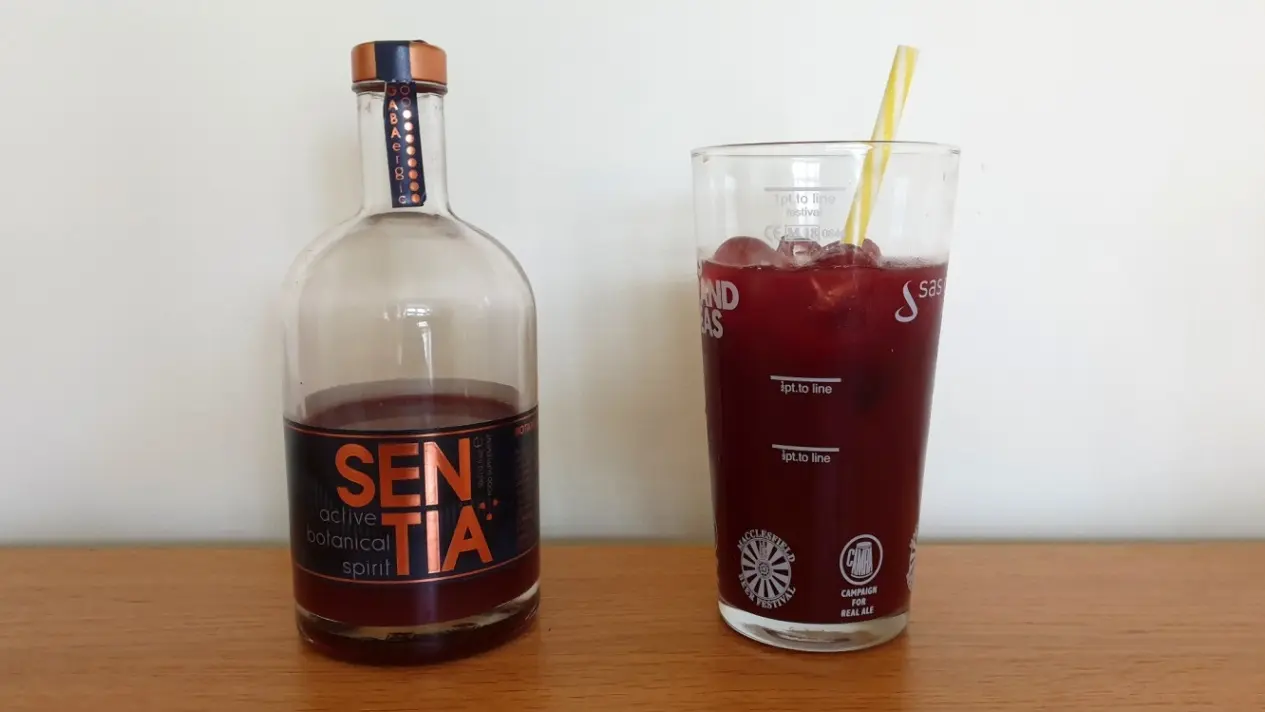Sentia #
| Common Nomenclature | Sentia |
| Street & Reference Names | N/A |
| Reference Dosage | Unknown |
| Anticipated: Onset / Duration | 10 Minutes / 3 Hours |
| Maximum Dose Experienced | 30ml |
| Form | Fluid |
| RoA | Oral |
| Source / Jurisdiction | Retailer |

SUBJECTIVE EXPERIENCE #
Sentia, launched in 2021, is a commercial product which I came upon courtesy of an article on Vice (a news portal). This described it as a “non-alcoholic botanical spirit” and pitched it as an alternative to alcohol.
Referring to the man behind it, Professor David Nutt, the article states:
“To create Sentia, Nutt and the team at GABA Labs searched thousands of databases and “found a number of herbs which make substances which work on the GABA system”, plus other herbs which accelerate their uptake.”
Further,
“We ended up developing this cocktail: four herbs that make GABA-like substances, three or four herbs that get it into the brain faster and the colouring,” Nutt explained.
Apparently this does not fall foul of UK legislation because the ingredients are already approved as foods or food supplements.
So what are those herbs? I reached out to Nutt and Gaba Labs by email, Twitter and Facebook Messenger. From this I received a message back from Gaba Labs via Facebook, which stated “It’s confidential, sorry.” Fortunately, the label on the bottle was rather more forthcoming. This listed amongst the contents: concentrates of blackberry and aronia, agave, hibiscus infusion, botanical & spice extracts (including damiana, rose, hawthorn, tulsi and gentian) and 5-HTP.
At £30 (about $40) for a 50cl bottle it was somewhat expensive, not least as the regular dose seems to be half of this (given that the label specifies a serving as 25ml). This is therefore what I pour into a glass, over ice, and begin to sip. [5:10pm].
It feels rather mellow in the mouth, but as it hits the back of the throat a ginger beer type aftertaste hits, which is quite strong. There is something of a flowery odour/taste which finds its way down the nasal passage, and isn’t unpleasant. It is a rather strange taste which could possibly be described as acquired, and that harsh hit at the back of the mouth/throat becomes less dominant as I drink, although it does linger. It could just be my shattered taste buds but there is also a hint of a chemical note there too.
In fairness, the taste may be peculiar but it is a lot more drinkable than a number of alcoholic liqueurs it has been my misfortune to encounter over the years. It’s okay. In 15 minutes it’s all gone.
Do I feel anything?
Yes. There is a slight headiness in play, some clarity of vision (which could be imagined) and I am a little more relaxed than I was half an hour ago. Perhaps it does equate to half a pint of beer or so, but as advertised, I don’t feel at all impaired. It is probably on a par with some of the herbs covered in Section 3.4 of this book. Whilst it is gentle, it is better than I expected it to be.
An hour later I still felt the effect, which gradually faded, although I remained of a positive disposition for some hours. At 8:30pm I finished the rest of the bottle. This re-invigorated the effect somewhat, before fading again.
Regarding the aftermath I had a slightly disturbed night’s sleep, punctuated by vivid recallable dreams. Perhaps this should not have been a surprise (see damiana). However, in the morning I felt quite well, with of course no hangover (but possibly the hint of a mood dip a few days later).
This is an interesting experiment by the developers and it remains to be seen if it will be successful. Sentia is certainly expensive, but an unanswered question is perhaps whether something as mild and subtle as this will be sufficient for regular consumers of a hard drug like alcohol.